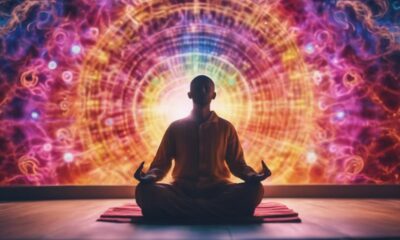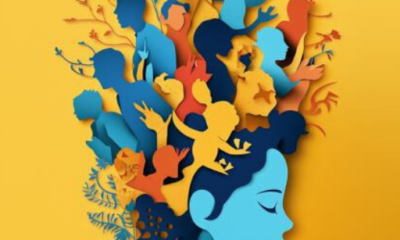Dreams
Demons In Dreams What Does It Mean

I have always been captivated by dreams. They serve as a portal to our subconscious, unveiling our most profound fears, longings, and emotions. At times, our dreams can be incredibly frightening, particularly when they feature demons.
But what do these demonic dreams really mean?
In this article, I’ll be exploring the significance of demons in dreams. We’ll take a look at the cultural and religious implications of these dreams, as well as the psychological interpretations. I’ll also share some common themes that often occur in dreams of demons, and techniques for analyzing them.
So, if you’ve ever woken up in a cold sweat after dreaming of demons, read on to find out what it all means.
Key Takeaways
- Demons in dreams can represent inner turmoil or conflict, unresolved fears or anxieties, and the shadow self.
- Personal beliefs and interpretations can affect how demons in dreams are perceived and understood.
- Techniques for analyzing dreams include keeping a dream journal and practicing lucid dreaming.
- Coping with nightmares can be done by grounding oneself, seeking support, using relaxation techniques, reframing the dream, and seeking professional help if needed.
Understanding the Nature of Dreams
Dreams are mysterious and often confusing, but understanding their nature can help us make sense of the demons that may appear in them. Dreams are essentially stories and images that our minds create while we sleep. They can be influenced by our subconscious thoughts, experiences, and emotions.
Dreams can be realistic or fantastical, and they can be based on our fears, desires, or even our daily experiences. It’s important to note that dreams are not always literal and shouldn’t be taken at face value. The meanings behind dreams can be complex and varied, and they can differ from person to person.
Dreams can be interpreted in many ways, and sometimes, the demons that appear in them may not necessarily represent evil or negative forces. With this in mind, let’s take an overview of the demons that may appear in our dreams.
Overview of Demons in Dreams
You may have experienced an unsettling presence while sleeping that can leave you feeling uneasy and unsure about what you just encountered. Demons in dreams are a common occurrence, and they can be a symbol of various things.
Some people believe that demons represent negative emotions or experiences that we’re trying to suppress or ignore. Others see them as a manifestation of our deepest fears and anxieties.
Regardless of the interpretation, demons in dreams can be a scary experience. They often leave us feeling drained and disturbed, wondering if what we experienced was real or just a figment of our imagination.
Understanding the cultural and religious significance of demons can help us make sense of these encounters and find ways to overcome them.
The Cultural and Religious Significance of Demons
Exploring the historical and spiritual context surrounding malevolent entities can shed light on their significance in various cultures and religions. In many belief systems, demons are seen as powerful and malevolent beings that can cause harm to humans. Some cultures even have specific rituals and practices to ward off these demons and protect oneself from their influence.
Religious texts often describe demons as fallen angels or spirits that have rebelled against God. In Christianity, demons are seen as tempters and tormentors, while in Hinduism and Buddhism, they are viewed as obstacles on the path to enlightenment. Regardless of the specific beliefs surrounding demons, their presence in dreams can be seen as a symbol of inner turmoil or external threats.
This leads to a psychological interpretation of demonic dreams, which will be discussed in the subsequent section.
Psychological Interpretations
Now, let’s dive into the fascinating world of interpreting the psychological significance behind these malevolent entities that often creep into our subconscious. As a psychologist, I’ve encountered many patients who have reported dreaming about demons. While these dreams can be terrifying, they can also offer valuable insights into a person’s psyche.
Here are three possible interpretations of why demons may appear in dreams:
-
Unresolved fears or anxieties: Demons may represent a person’s deepest fears or anxieties, particularly those that haven’t been adequately addressed. They can serve as a metaphor for the things that we’re afraid of facing head-on.
-
Inner turmoil or conflict: Demons may also represent the inner turmoil or conflict that a person is experiencing. They can be a manifestation of the battle between different parts of the psyche, such as the id, ego, and superego.
-
The shadow self: In Jungian psychology, the shadow self represents the darker, less conscious aspects of a person’s personality. Demons may be a symbolic representation of this shadow self, which people often try to repress or deny.
With these possible interpretations in mind, let’s move on to the next section about common themes in dreams of demons.
Common Themes in Dreams of Demons
Discovering the recurring themes in dreams featuring malevolent entities can provide valuable insights into the mysterious workings of the human mind. When it comes to dreams of demons, there are several common themes that tend to emerge.
One of the most frequent is a feeling of suffocation or being trapped, as though the dreamer is unable to escape the clutches of the demon. Other common themes include feelings of fear, anxiety, and general unease.
In some dreams, the demon may take on a specific form, such as a dark figure or a monster. In others, the demon may be more abstract, appearing as a looming sense of dread. Regardless of the form it takes, the demon often represents some kind of internal struggle or conflict that the dreamer is experiencing.
Understanding these common themes can help us to better understand our own dreams and the messages they may be trying to convey. From here, we can move into exploring personal beliefs and interpretations without missing a beat.
Personal Beliefs and Interpretations
By delving into my personal beliefs and interpretations, I’ve come to understand that the symbolic language of my subconscious mind speaks to me through my dreams.
When it comes to demons in my dreams, I interpret them as a representation of my inner fears and anxieties. I believe that these fears may stem from personal experiences or cultural influences, such as movies and books that portray demons as entities that bring harm and destruction.
-
The feeling of powerlessness – Whenever I encounter a demon in my dreams, I feel overwhelmed and powerless. This feeling is often accompanied by a sense of fear and dread, which can be quite unsettling.
-
The struggle for control – In my dreams, demons often represent the struggle for control over my own thoughts and emotions. I’m forced to confront my inner demons and fight against them in order to regain control over my own mind.
-
The need for self-reflection – In my interpretation, demons in my dreams serve as a reminder to take a step back and reflect on my own fears and anxieties. They force me to confront the darker aspects of my psyche and work through them in order to achieve a greater sense of inner peace.
By understanding my personal beliefs and interpretations of demons in my dreams, I can begin to analyze the symbolic language of my subconscious mind and gain a deeper understanding of my own psyche.
In the next section, I’ll explore different techniques for analyzing my dreams in order to gain a greater sense of self-awareness.
Techniques for Analyzing Dreams
You can utilize various techniques to analyze your dreams and gain a deeper understanding of your subconscious mind. One of the most common techniques is keeping a dream journal. By documenting your dreams immediately upon waking, you can accurately recall the details and emotions experienced in the dream. This allows you to reflect on the dream and identify any recurring symbols or themes that may be significant to your personal life.
Another technique is practicing lucid dreaming, which involves becoming aware that you are dreaming while still in the dream. This allows you to control the dream and explore your subconscious mind in a more intentional way. By analyzing the actions and events in the dream, you can gain insight into your thoughts, feelings, and desires.
These techniques for analyzing dreams can help you better understand the messages your subconscious mind is attempting to communicate, and ultimately lead to a greater sense of self-awareness. Coping with nightmares is another important aspect of dream analysis, which we will explore in the subsequent section.
Coping with Nightmares
If you’ve ever woken up in a cold sweat after a nightmare, coping with the aftermath can feel like navigating a minefield: as tricky as tiptoeing through a field of tulips with an elephant. However, there are a few things that can help you deal with the distressing emotions and images that may linger long after the dream has ended. Here are five simple techniques that’ve worked for me:
-
Ground yourself: Take a few deep breaths and focus on your physical surroundings. Look around the room, touch the bed, feel the covers, and remind yourself that you’re safe and in control.
-
Write it down: Jotting down the details of your dream can help you process your thoughts and emotions. It can also provide insight into underlying fears or anxieties that may be causing the nightmares.
-
Practice relaxation: Engage in calming activities like yoga, meditation, or a warm bath before bedtime. This can help reduce stress and anxiety, which can trigger nightmares.
-
Talk to someone: Share your experiences with a trusted friend or therapist. Talking about your fears and concerns can help release the emotional tension and provide a fresh perspective on the situation.
-
Replace the negative with positive: Before going to bed, visualize positive scenarios or affirmations that counteract the negative themes in your nightmares. This can help shift your focus towards a more hopeful and peaceful state of mind.
Dealing with nightmares can be challenging, but with a little effort and patience, you can overcome them. It’s important to take care of yourself and prioritize your mental health. Speaking of which, getting enough sleep and rest is crucial for both physical and mental wellbeing.
The Importance of Sleep and Rest
I’ve found that managing stress and anxiety is crucial to maintaining a healthy sleep routine.
When I’m feeling overwhelmed, my mind races at night and I struggle to fall asleep.
To combat this, I’ve implemented relaxation techniques such as deep breathing and meditation before bed.
By taking care of my mental health, I’m able to get the restful sleep my body needs to function at its best.
Managing Stress and Anxiety
By finding healthy coping mechanisms and practicing relaxation techniques, one can effectively manage stress and anxiety related to recurring nightmares involving demons. It is important to identify the root cause of the stress and anxiety, which may be related to work, relationships, or personal issues. Once the cause is identified, one can take steps to address it, such as seeking therapy or counseling, talking to a trusted friend or family member, or engaging in stress-reducing activities like exercise or meditation.
In addition to addressing the root cause of stress and anxiety, it is important to practice relaxation techniques to calm the mind and body before bed. This can include deep breathing exercises, progressive muscle relaxation, or visualization techniques. By incorporating these techniques into a nightly routine, one can create a sense of calm and relaxation that can help prevent nightmares and promote restful sleep. Maintaining a healthy sleep routine is crucial for overall health and well-being, and managing stress and anxiety related to nightmares is just one aspect of achieving this goal.
Maintaining a Healthy Sleep Routine
To maintain a healthy sleep routine and ensure my body’s well-rested, I know it’s important to create a peaceful and comfortable sleeping environment that symbolizes relaxation and tranquility. This means investing in a comfortable mattress and pillows, choosing bedding that feels soft and soothing, and keeping my bedroom free of clutter or distractions.
I also make it a point to wind down before bed, avoiding screens and stimulating activities in the hours leading up to bedtime, and instead opting for calming rituals like reading or taking a warm bath.
By creating a consistent and peaceful sleep routine, I’m able to embrace the unknown that comes with dreaming. As much as we try to control our thoughts and experiences while we sleep, dreams are often unpredictable and strange.
But rather than fearing these unknown elements, I try to approach my dreams with a sense of curiosity and openness, recognizing that they can often reveal hidden truths and insights about my subconscious mind.
By prioritizing my sleep and embracing the mystery of my dreams, I’m able to approach each day with more clarity and vitality.
Embracing the Unknown
Embracing the unknown can be uncomfortable, but it can lead to growth and self-discovery. Dreams are a prime example of the unknown we encounter every night. Sometimes, we dream of things we can’t explain, like demons. It’s easy to feel scared and uneasy when we dream of demons, but it’s important to embrace these dreams and understand their meaning.
Here are three reasons why embracing the unknown, especially in dreams, can be beneficial:
- Dreams can reveal our deepest fears and desires, allowing us to confront them in a safe environment.
- By exploring the unknown in our dreams, we can gain a better understanding of ourselves and our subconscious.
- Embracing the unknown can lead to personal growth and self-discovery as we learn to face and overcome our fears.
So, the next time you have a scary or unknown dream, don’t run away from it. Instead, embrace it and see what it can teach you about yourself.
Frequently Asked Questions
How can I prevent having nightmares about demons?
How can I prevent having nightmares about demons? I find that listening to calming music before bed helps. I also avoid watching scary movies or reading horror stories late at night. It’s important to create a peaceful and relaxing environment to promote restful sleep.
Is it possible for demons in dreams to be a sign of a physical illness?
It’s possible for demons in dreams to be a sign of a physical illness. However, it’s important to consider other factors, like stress or anxiety, before jumping to conclusions. It’s best to consult with a medical professional.
Can dreaming about demons be a form of communication with the supernatural?
Dreaming about demons can be a form of communication with the supernatural. It’s a way for them to convey a message or warning. However, it’s important to differentiate between actual communication and just a regular nightmare.
Are there any specific rituals or prayers that can be done to ward off demons in dreams?
To ward off demons in dreams, I’ve found that reciting a protective prayer or visualization can help. It’s like putting up a shield to keep them at bay.
Is it common for people to have recurring dreams about demons?
I frequently have recurring dreams about demons. It’s unsettling and can feel very real. I’ve tried different methods to ward them off, but they persist. It’s a common experience for many people.
Conclusion
So, that’s what demons in dreams mean. It’s fascinating how the interpretation of dreams has evolved over time, with cultural and religious beliefs shaping our understanding. But ultimately, dreams are a reflection of our inner selves and our subconscious mind.
They offer us a glimpse into our fears, desires, and unresolved issues. Like a window into our soul, dreams can be both intriguing and terrifying. But rather than fear them, we can learn to embrace the unknown and use our dreams as a tool for self-discovery.
So, next time you have a dream about demons, don’t be afraid. Instead, take a moment to reflect on what it could mean for you and how you can use that knowledge to grow and evolve. Sweet dreams!
Meet Kiran, the guiding light of wisdom behind the empowering content at OurMindAndBody.com. As a talented and compassionate writer, Kiran weaves words with grace and insight, sharing profound knowledge and practical advice to inspire positive transformations in the lives of readers.
With a background in psychology and a deep-rooted passion for well-being, Kiran brings a unique blend of expertise and empathy to her writing. Her journey into the realm of mindfulness, meditation, and yoga began as a personal quest for self-discovery and healing. Having experienced the profound benefits of these practices firsthand, Kiran is committed to empowering others to embark on their own journeys of self-exploration and growth.
Dreams
Choking On Dreams: Unveiling Hidden Desires And Facing Subconscious Issues

In the world of dreams, our minds create a intricate web of symbols and metaphors, providing insight into our subconscious. One such mysterious vision is the feeling of suffocating on dreams, which serves as a potent symbol revealing unspoken desires and addressing lingering problems within us.
Like a tightly knotted knot in the throat, this symbolic manifestation represents a multitude of emotions and experiences that yearn to be acknowledged and understood. It serves as a reflection of our self-respect, feelings of inadequacy, and the need for control and assistance in the tangled web of relationships and situations we navigate.
Moreover, it signifies the challenges we face in our personal and professional lives – the need for protection, restraint, and closure. By delving into the depths of these dreams, we embark on a journey of self-discovery, unraveling the threads of our subconscious and unlocking the door to personal growth and emotional well-being.
Key Takeaways
- Food stuck in the throat in a dream represents self-respect, feelings of inadequacy or unqualification, and the need for help and control in a situation or relationship.
- Dreaming of food stuck in the throat signifies emotional and physical recovery, underlying desires, and the need to let fate take its course.
- The dream of something stuck in the throat expresses criticism, fury, loss, pain, negativity, and subconscious negative feelings of poverty, lack, and inadequacy.
- The dream suggests future hopes and fears, the need to unveil hidden aspects of oneself, lack of trust, and the need to face subconscious issues.
Throat Symbolism
The symbolism of the throat in dreams relates to self-expression, the need for truthfulness, and the exploration of subconscious issues, as indicated by the representation of the throat chakra and the various objects or sensations that may be stuck in the throat.
The throat chakra is associated with communication and self-expression, suggesting that dreams involving the throat highlight the importance of expressing oneself honestly and authentically. This symbolism emphasizes the significance of telling the truth in relationships, as the throat represents the ability to communicate openly and honestly with others.
Dreams of something stuck in the throat may indicate a subconscious desire to speak the truth or a struggle with expressing oneself truthfully in certain relationships. It suggests that exploring and addressing these hidden desires and subconscious issues is essential for personal growth and development.
Emotional Recovery and Closure
Emotional recovery and closure can be achieved through the process of acknowledging and addressing unresolved feelings and experiences. Overcoming past traumas is a crucial step in this process, as it allows individuals to confront and heal from deep-seated emotional wounds.
By acknowledging and processing these traumas, individuals can begin to release the negative emotions associated with them, leading to a sense of inner peace and emotional well-being.
Finding inner peace is another important aspect of emotional recovery and closure. This involves cultivating a sense of acceptance and forgiveness, both for oneself and others involved in the past experiences. Letting go of resentment and anger allows individuals to move forward and create a healthier emotional state.
Additionally, practicing self-care and engaging in activities that promote relaxation and self-reflection can contribute to finding inner peace.
Emotional recovery and closure involve the process of overcoming past traumas and finding inner peace. By addressing unresolved feelings and experiences, individuals can release negative emotions and cultivate a sense of acceptance, forgiveness, and inner tranquility.
Manifestation of Unconscious Feelings
Manifestation of unconscious feelings can provide valuable insights into one’s innermost thoughts and emotions, offering a glimpse into the depths of the human psyche. In the context of dreaming, the manifestation of choking on dreams highlights the importance of self-expression and the healing process.
Dreams in which something is stuck in the throat symbolize the need to overcome self-doubt and insecurities. This manifestation indicates that there may be hidden desires and subconscious issues that need to be addressed. By confronting these feelings and expressing oneself, individuals can embark on a journey of emotional recovery and closure.
The throat, as the seat of self-expression, plays a crucial role in this process. By examining and understanding the underlying emotions behind the dream, individuals can gain valuable insights into their own psyche and take steps towards personal growth and healing.
Conclusion
In conclusion, the metaphorical representation of ‘choking on dreams’ serves as a powerful tool for unveiling hidden desires and facing subconscious issues. Through the symbolism of the throat, this dream signifies the importance of self-respect, self-expression, and the need for help and control in various aspects of life.
By exploring these dreams and delving into the emotional recovery and closure they provide, individuals can gain insight into their unconscious feelings and ultimately embark on a journey of personal growth and self-discovery.
The manifestation of these hidden desires and subconscious issues not only allows for introspection but also emphasizes the significance of effective communication, truth-telling, and examining the root causes of one’s experiences.
This analytical and theoretical approach to understanding dreams offers a profound perspective on the complexities of the human psyche and the power of self-reflection.
Meet Kiran, the guiding light of wisdom behind the empowering content at OurMindAndBody.com. As a talented and compassionate writer, Kiran weaves words with grace and insight, sharing profound knowledge and practical advice to inspire positive transformations in the lives of readers.
With a background in psychology and a deep-rooted passion for well-being, Kiran brings a unique blend of expertise and empathy to her writing. Her journey into the realm of mindfulness, meditation, and yoga began as a personal quest for self-discovery and healing. Having experienced the profound benefits of these practices firsthand, Kiran is committed to empowering others to embark on their own journeys of self-exploration and growth.
Dreams
Communication From Beyond: When Our Beloved Pets Visit In Dreams

In the world of dreams, a mystical bond can be created between the living and the departed. It is often said that “When we shut our eyes, our souls are exposed to the endless possibilities of the universe.” This belief rings true for individuals who have encountered the powerful occurrence of visitation dreams involving their deceased pets.
These ethereal encounters, often occurring in the form of a deceased cat, provide solace and a sense of connection with our beloved companions who have crossed over. While these dreams may seem surreal, they hold significant meaning and symbolism. Understanding the messages and symbols conveyed in these visitation dreams can offer insight into the spiritual realm and provide comfort to grieving pet owners.
In this article, we explore the circumstances surrounding these visitations, delve into the depths of their meanings, and uncover the profound messages that our departed pets bring to us in our dreams.
Key Takeaways
- Dreaming about a deceased pet is a common sign of communication from the pet.
- Deceased pets may visit their owners in dreams to convey comfort or pass on messages.
- Visitation dreams of deceased pets can bring closure to the dreamer.
- Interpretations of visitation dreams can provide insight into their meaning.
When do they visit?
Visitation dreams of deceased pets can occur at any time, providing comfort, reassurance, and important messages to their owners.
The frequency and timing of these dreams can vary for each individual. Factors that may influence the occurrence of visitation dreams include the strength of the bond between the owner and the pet, the level of grief experienced by the owner, and the openness of the owner’s mind to receiving messages from beyond.
These dreams often occur when the owner is in a relaxed state, such as during sleep or meditation, allowing for a deeper connection to be established.
It is important to note that not everyone may experience visitation dreams, as it depends on the individual’s spiritual beliefs and their ability to connect with the spiritual realm.
Nonetheless, when these dreams do occur, they can bring a sense of solace and healing to the grieving pet owner.
Meaning of visitation dreams
The interpretation of dreams involving departed animals can offer valuable insights into the symbolic meanings and messages they may convey. When it comes to visitation dreams of deceased pets, understanding their significance is crucial for gaining a deeper understanding of the messages being communicated.
These dreams hold a spiritual and emotional significance, acting as a form of communication between the dreamer and their departed pet. The visitation dreams serve as a means for the pet to provide comfort, reassurance, and closure to their owners. They may also offer warnings, advice, and share beneficial ideas.
The interpretation of these dreams depends on the actions and occurrences within the dream, such as seeing and petting the deceased cat, which may symbolize luck and the sharing of beneficial ideas.
Overall, visitation dreams of deceased pets hold great significance and provide a unique opportunity for communication from beyond.
Symbols and messages
Symbols and messages conveyed in dreams involving deceased pets hold significant meaning and provide a unique opportunity for individuals to receive communication from their departed companions. Interpreting visitation dreams and understanding the symbolism within them can offer insight and comfort to those grieving the loss of their beloved pets. Dreams involving deceased pets often contain symbols that reflect the qualities or experiences associated with the animal during its life. These symbols can include specific colors, objects, or actions that hold personal significance for the dreamer.
Additionally, messages from deceased pets can be conveyed through emotions, sensations, or even direct communication within the dream. It is important for individuals to pay attention to these symbols and messages, as they can provide guidance, comfort, and a sense of connection with their departed pets.
Frequently Asked Questions
Can deceased pets visit in dreams even if their owners have never had a visitation dream before?
Unexplained encounters with deceased pets visiting in dreams can occur even if their owners have never had a visitation dream before. These encounters can bring emotional healing and comfort to grieving pet owners.
Dreams of deceased pets often have a profound emotional impact, allowing individuals to process their grief and find closure.
This mysterious phenomenon provides a unique opportunity for individuals to connect with their beloved pets on a spiritual level, offering solace and support during the mourning process.
Do all visitation dreams from deceased pets have a specific meaning or message?
To delve into the meaning behind visitation dreams from deceased pets, one must consider the emotional significance they hold. These dreams offer a glimpse into a realm beyond our waking reality, where our departed companions reach out to us.
Interpreting these dreams requires a deep understanding of the bond between humans and their pets, as well as the intricate language of symbols and signs. By exploring the messages conveyed in these dreams, we can gain insight, comfort, and a sense of connection with our beloved pets, even in their ethereal form.
Can visitation dreams from deceased pets occur years after their passing?
Visitation dreams from deceased pets can occur years after their passing, impacting the dreamer in various ways. These long-term effects can provide comfort, closure, and a sense of continued connection with the pet.
The dreamer may experience a deep emotional response, ranging from subtle feelings of peace to overwhelming grief.
Additionally, visitation dreams can occur even if there is no logical explanation for the pet’s presence, suggesting a spiritual connection beyond the physical realm. These unexplained occurrences serve as a reminder of the enduring bond between the dreamer and their beloved pet.
Are there any common symbols or themes that appear in visitation dreams from deceased pets?
Symbolic interpretations of visitation dreams from deceased pets often involve common symbols and themes. These can include:
- Seeing the pet in their energetic form
- Sensing their presence near their old living areas
- Receiving messages through telepathic communication
These symbols and themes can provide emotional healing through dreams, bringing comfort and closure to the dreamer. Dreams act as a conduit for communication from beyond, allowing owners to connect with their departed pets and receive messages of reassurance, comfort, and guidance.
How can one differentiate between a regular dream and a visitation dream from a deceased pet?
One interesting statistic is that according to a study, 60% of people who have lost a pet report experiencing visitation dreams from their deceased companion.
When differentiating between ordinary dreams and visitation dreams, there are several signs to look for. In visitation dreams, the deceased pet may appear in their energetic form, provide comfort or convey messages, and bring feelings of peace. These dreams often feel vivid and may involve telepathic communication, distinguishing them from regular dreams.
Conclusion
In conclusion, visitation dreams from our deceased pets can provide comfort and closure to those who have lost them.
These dreams can symbolize various meanings, such as offering comfort, warnings, and advice, and are often associated with the past.
The actions and occurrences within the dream can provide insight into its interpretation.
While some may question the validity of visitation dreams, they hold deep emotional and spiritual significance for many individuals.
These dreams bring feelings of peace and reassurance, allowing us to connect with our beloved pets even after they have passed away.
Meet Kiran, the guiding light of wisdom behind the empowering content at OurMindAndBody.com. As a talented and compassionate writer, Kiran weaves words with grace and insight, sharing profound knowledge and practical advice to inspire positive transformations in the lives of readers.
With a background in psychology and a deep-rooted passion for well-being, Kiran brings a unique blend of expertise and empathy to her writing. Her journey into the realm of mindfulness, meditation, and yoga began as a personal quest for self-discovery and healing. Having experienced the profound benefits of these practices firsthand, Kiran is committed to empowering others to embark on their own journeys of self-exploration and growth.
Dreams
Anxiety And Desire: Unveiling The Meaning Behind Dreaming Of Your Boyfriend Marrying Someone Else

Delving into the complex world of our dreams can offer deep understanding of our innermost wishes and fears. Within the many dream scenarios, imagining your partner getting married to someone else often stirs up strong feelings. Explore more to uncover the secrets hidden in your dreams.
This dream, veiled in the realm of anxiety and desire, holds multifaceted meanings that tap into the complexities of our subconscious minds. Drawing from psychological research and dream analysis, this article aims to shed light on the underlying implications of dreaming about your boyfriend marrying another person.
By exploring common interpretations, emotional significance, and reflections on relationships, we will delve into the depths of these dreams to decipher their hidden messages. This examination will not only aid in understanding the psychological landscape of dreams but also provide valuable insights into our own emotions, relationships, and personal growth.
Through an objective and evidence-based exploration, we embark on a journey to uncover the enigmatic meaning behind these dreams of love and betrayal.
Key Takeaways
- Dreams about your boyfriend marrying someone else often signify anxiety and tension related to wedding planning and fear of things going wrong.
- Dreaming of your boyfriend getting married reflects a return to childhood and a stage of personal growth and development.
- Dreaming that the person you love is getting married to someone else may indicate insecurity or envy and a lack of commitment toward you.
- Dreams about a loved one marrying someone else may suggest unresolved lover issues and the need for forgiveness and moving on.
Common Interpretations
One common interpretation of dreaming of your boyfriend marrying someone else is that it may reflect a desire for more romance in the personal connection and a wish for a happy family.
Psychological implications of this dream suggest that it represents anxiety and tension related to wedding planning and fear of things going wrong. It can also symbolize a stage of personal growth and development, reflecting a return to childhood.
The dream may indicate a need for progress and independence in one’s journey. Symbolic representations in this dream include a reflection of unresolved issues in the relationship or concerns about a new relationship. It may also signify worries about past hurts and fear of getting hurt again in the current relationship.
Overall, this dream highlights a longing for a stronger emotional connection and a need for communication and discussion of relationship concerns.
Emotional Significance
The emotional significance of dreaming about your partner marrying another person can provide insight into underlying concerns and feelings within the dreamer.
These dreams may evoke a range of emotions such as anxiety, insecurity, envy, and fear.
Psychologically, they may reflect unresolved issues in the dreamer’s current or past relationship, concerns about trust and commitment, or a desire for more romance and connection.
It is important to interpret and cope with these dreams in a healthy manner. This can involve exploring the root causes of the emotions and fears triggered by the dream, engaging in open and honest communication with one’s partner, seeking professional help if needed, and practicing self-care and self-reflection.
By understanding and addressing the psychological implications of these dreams, individuals can gain insight into their own emotions and work towards building healthy and fulfilling relationships.
Relationship Reflections
Relationship reflections can be gleaned from dreams of a partner marrying another person, shedding light on underlying concerns, emotions, and unresolved issues within the dreamer. These dreams serve as a form of self-reflection, providing insight into the dreamer’s relationship insecurities and fears. Here are four key points to consider:
-
Insecurity: Dreaming of a partner marrying someone else may indicate feelings of insecurity within the relationship. It suggests a fear of not being enough for the partner or a lack of trust in their commitment.
-
Trust and Communication: These dreams highlight the importance of trust and open communication in a relationship. They may indicate a need for the dreamer to address their concerns and insecurities with their partner to strengthen the bond.
-
Past Hurts: Dreams of a partner marrying someone else can also stem from unresolved issues or past hurts. The dreamer may be carrying emotional baggage from previous relationships, leading to trust issues in the current relationship.
-
Self-Reflection: Such dreams prompt the dreamer to reflect on their own needs, desires, and fears. It is an opportunity for self-exploration and understanding, allowing the dreamer to identify areas of personal growth and development within the relationship.
By analyzing these relationship reflections, individuals can gain a deeper understanding of their own emotions and work towards building a stronger and more secure relationship.
Frequently Asked Questions
What does it mean if I dream of my boyfriend marrying someone else, but I am not currently in a relationship?
The psychological interpretation of dreaming about one’s boyfriend marrying someone else, despite not being currently in a relationship, suggests that it may reflect unresolved emotions and subconscious processing of past experiences. Symbolically, this dream could represent a fear of being replaced or a longing for a committed relationship. Dream analysis indicates the need for self-reflection and examination of one’s desires and fears. It is important to note that dreams may not always directly relate to one’s present circumstances and should be interpreted with caution.
Can dreaming of your boyfriend marrying someone else be a sign of infidelity or a lack of trust in the relationship?
Dreaming of your boyfriend marrying someone else does not necessarily indicate infidelity or a lack of trust in the relationship. Instead, it may reflect possible underlying fears and insecurities about commitment. It is important to consider the impact of past experiences on current relationships, as dreams can be influenced by unresolved issues and concerns.
However, it is crucial to approach dream interpretation objectively and not jump to conclusions about the state of the relationship based solely on a dream.
Does dreaming of your boyfriend marrying someone else always indicate a desire for more romance in the relationship?
Dreams of your boyfriend marrying someone else do not always indicate a desire for more romance in the relationship. These dreams can reflect emotional insecurities and fears within the individual. Discussing these dreams with your partner can help build trust and strengthen the relationship by promoting open communication.
By understanding the underlying emotions and concerns behind these dreams, couples can address any insecurities and work towards a more secure and fulfilling relationship.
Are there any specific actions or steps I should take if I frequently dream of my boyfriend marrying someone else?
Relationship reassessment and communication with your partner are key actions to consider if you frequently dream of your boyfriend marrying someone else. It is important to discuss your concerns and fears with your partner openly and honestly, as this can help address any underlying issues and strengthen your relationship.
Engaging in open dialogue can also provide clarity and understanding, allowing both parties to reassess the relationship and make informed decisions moving forward. Additionally, seeking professional guidance, such as couples therapy, can be beneficial in navigating these dreams and their potential impact on the relationship.
Can dreams about a loved one marrying someone else be a reflection of past relationship trauma or unresolved issues?
Dream interpretation and psychological analysis suggest that dreams about a loved one marrying someone else can indeed be a reflection of past relationship trauma or unresolved issues. These dreams may symbolize a fear of repeating past mistakes or a need for closure and forgiveness. They could also indicate unresolved emotions and a desire to heal from previous relationship experiences.
Psychological analysis of such dreams can provide insights into one’s subconscious thoughts and emotions, ultimately aiding in personal growth and self-reflection.
Meet Kiran, the guiding light of wisdom behind the empowering content at OurMindAndBody.com. As a talented and compassionate writer, Kiran weaves words with grace and insight, sharing profound knowledge and practical advice to inspire positive transformations in the lives of readers.
With a background in psychology and a deep-rooted passion for well-being, Kiran brings a unique blend of expertise and empathy to her writing. Her journey into the realm of mindfulness, meditation, and yoga began as a personal quest for self-discovery and healing. Having experienced the profound benefits of these practices firsthand, Kiran is committed to empowering others to embark on their own journeys of self-exploration and growth.
-

 Spirituality3 months ago
Spirituality3 months agoHow to Learn About Spiritual Energy: A Beginner's Guide!
-

 Spirituality3 months ago
Spirituality3 months agoHow to Keep Your Spiritual Energy High: Stay Vibrant!
-

 Spirituality3 months ago
Spirituality3 months agoHow to Increase Your Spiritual Energy: Simple and Effective Ways!
-

 Angel Numbers3 months ago
Angel Numbers3 months agoHow to Manifest When Seeing Angel Numbers
-

 Spirituality3 months ago
Spirituality3 months agoHow to Know if You Have High Spiritual Energy: Signs and Tips!
-

 Angel Numbers3 months ago
Angel Numbers3 months agoHow to Meditate on Angel Numbers
-

 Personal Growth3 months ago
Personal Growth3 months agoBook Review: “The Creative Spark: Unleashing Your Inner Artist”
-

 Angel Numbers3 months ago
Angel Numbers3 months agoHow to Choose the Right Angel Numbers











